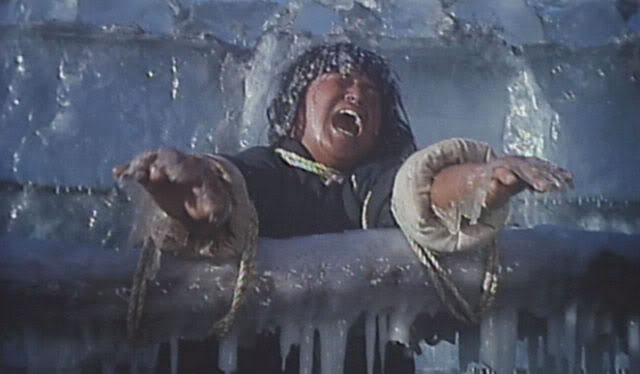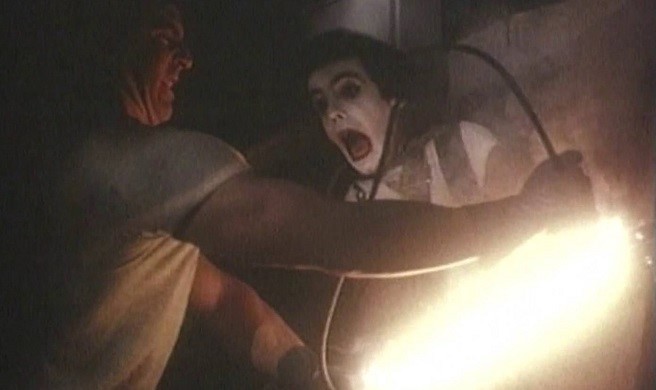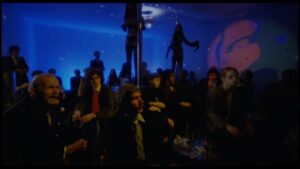Directed by Mou Tun-Fei
Written by Mei Liu, Wen Yuan Mou and Dun Jing Teng
Starring:
- Gang Wang as Lt. Gen. Shiro Ishii
- Dai Yao Wu
- Runshen Wang as the Camp Lieutenant
- Zhe Quan
- Zhaohua Mei
- Tie Long Jin
Rating: ![]()
When it comes to insanely unpleasant movies to watch, Hong Kong’s unspeakably callous historical exploitation picture Men Behind the Sun bears the notorious distinction of being the cinematic equivalent of an agonizingly soul-crushing, emetic torture. If you seek it out, you damn well know what you’re going to get. For the downright appalling flick that prompted Hong Kong motion picture rating system to enforce more stringent and effective rating criteria in 1988 resulting in the so-called Category III – incorrectly viewed as the Asian variant of the UK’s Video Nasty list – Men Behind the Sun does full justice to the infamy attached to the myth. Having said that, rather than an unmistakably uncomfortable film to watch, I personally found it more challenging than uncomfortable. And by this I don’t mean that it is not uncomfortable per se -it is undoubtedly a disturbing viewing-, what I mean is that its diabolical coldness coupled with its sinister infectious power transgresses every boundary that exploitation filmmaking can muster, which leads me to speculate that that discomfort derives more from its defiant graphic display of man-made atrocities as opposed to its tastelessness in itself for being unduly explicit.
It is as if the truculent filmmakers were in a state of unnerving ambivalence throughout this exercise in arrestingly tastelessness. Firstly, since the perspectives are propagandist, this is a Hong Kong film chronicling the genocide against its people perpetrated by the Japanese Imperial Army, which ineluctably offers a sensationalist view into the gruesome crimes against humanity rather than a realistic approach. Secondly, because any trace of gravitas that can be found in these tendentious procedures is quickly refuted by the unrelenting sadism shown by the filmmakers for depicting pornographic cruelty at the expense of factual genocide. And last but not least, the ugly staging appears more like a theater of the grotesque than a theater of the real. Each point is equivocal because it is never discernible what the ultimate purpose is. Is it just a distasteful shocker? Or is it a film that genuinely aims to educate viewers about the ideological perversion of totalitarianism through an explicit chronicle of it? You never can tell, especially when you have a film that plays at being both authentically emotional and falsely emotional. That’s what challenged my intellect and morals during every gut-wrenching minute I spent watching this miserable hell on earth.
Mou Tun-Fei’s Men Behind the Sun is unsettling because it challenges human sensibilities in so many different respects. But first, let’s elaborate a bit on its bleak synopsis. The film’s collective focus is on the evil Unit 731, a covert chemical and biological warfare research unit dedicated to conducting lethal experiments on humans during the Second Sino-Japanese War. The villainous surgeon general Shirō Ishii (Gang Wang) commands the Unit 731 facility, where they also instruct (or rather indoctrinate) a group of Japanese teens to become part of the unit in order to carry out the experiments more expeditiously. All of this takes place in the last year of World War II, just months before the surrender of the Japanese Empire. Thus what we get to experience is a raw, rushed look at the crimes committed by this bunch of abominable monsters.
There is nothing to appreciate here, it’s just bloody torture. However, the simple process of indoctrinating these children adds a certain dramatic intensity to the film that transcends miserabilism. In the midst of these unsuspecting boys observing and being forced to study the depraved methods, there is a vagrant boy loitering in the vicinity of the camp. He is the picture of hope, he is playful and inquisitive, like all children exploring the world. He smiles joyously and seeks the attention of the teenagers in the camp. Beyond the one glimmer of hope amidst the oppressive evil of the surroundings, this character is elementally metaphorical. He is mute, encompassing the immaculate as a contrast to the foul war. His silence and naive playfulness turn his image into a rhetoric of peace. But… it is precisely with this character that the film defies human sensibility as I mentioned earlier. Well, one would think that his cute elemental figure of a neglected but blissful child might have worked to some extent in the same way that the red-clad little girl in Schindler’s List functioned as a humanist iconography. But that’s not the case here, because the cruelty of the ruthless writing goes so far as to give that child one of the most gruesome, unaccountably sickening fates ever put on celluloid. It is nauseating misanthropy and an assault on humanity that the mere thought that such ghastly crimes occurred renders it all the more unbearable.
Needless to say, the movie is fragmented into sections where they feature tortures one nastier than the other. So, I will simply avoid getting into a sensationalist review by explaining in detail what they are like. This is my limit. However, I do consider it of utmost importance to mention that despite its feast of inhumanity, controversial director Mou Tun-Fei leaves in plain sight an admirable exploitation scheme; this could have been just offensive and farcical cinema, but it is due to the stationary cinematic layout – icy and uncompromising – that the Chinese filmmaker manages to instill an unpleasant mood that few filmmakers – or rather none – can handle.
In times of so much juvenile violence and cosmetic gore in movies that only splatter blood and viscera but without sleaze or willful bad taste, it is mesmerizing to witness this kind of unapologetic methodology that persistently aims to strike at human ethics regardless of exploitative pretensions; this is genuine provocation brimming with conflicting feelings from which you cannot tell where the validity of its compelling filmmaking springs from, be it intellectual or purely visceral. Men Behind the Sun features images so damaging that they are shocking beyond their wickedness, they are notable for approaching the kind of evil that this world has unfortunately seen materialized in modern history. Maybe it’s a masterpiece dressed up as an exploitation piece that on a second viewing will hopefully reveal its better side as a historical showpiece if it is one, though I seriously doubt I’ll ever revisit it.









